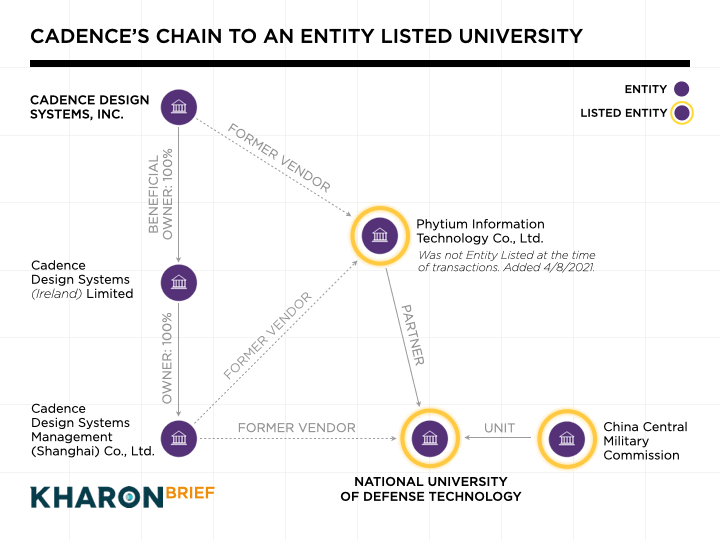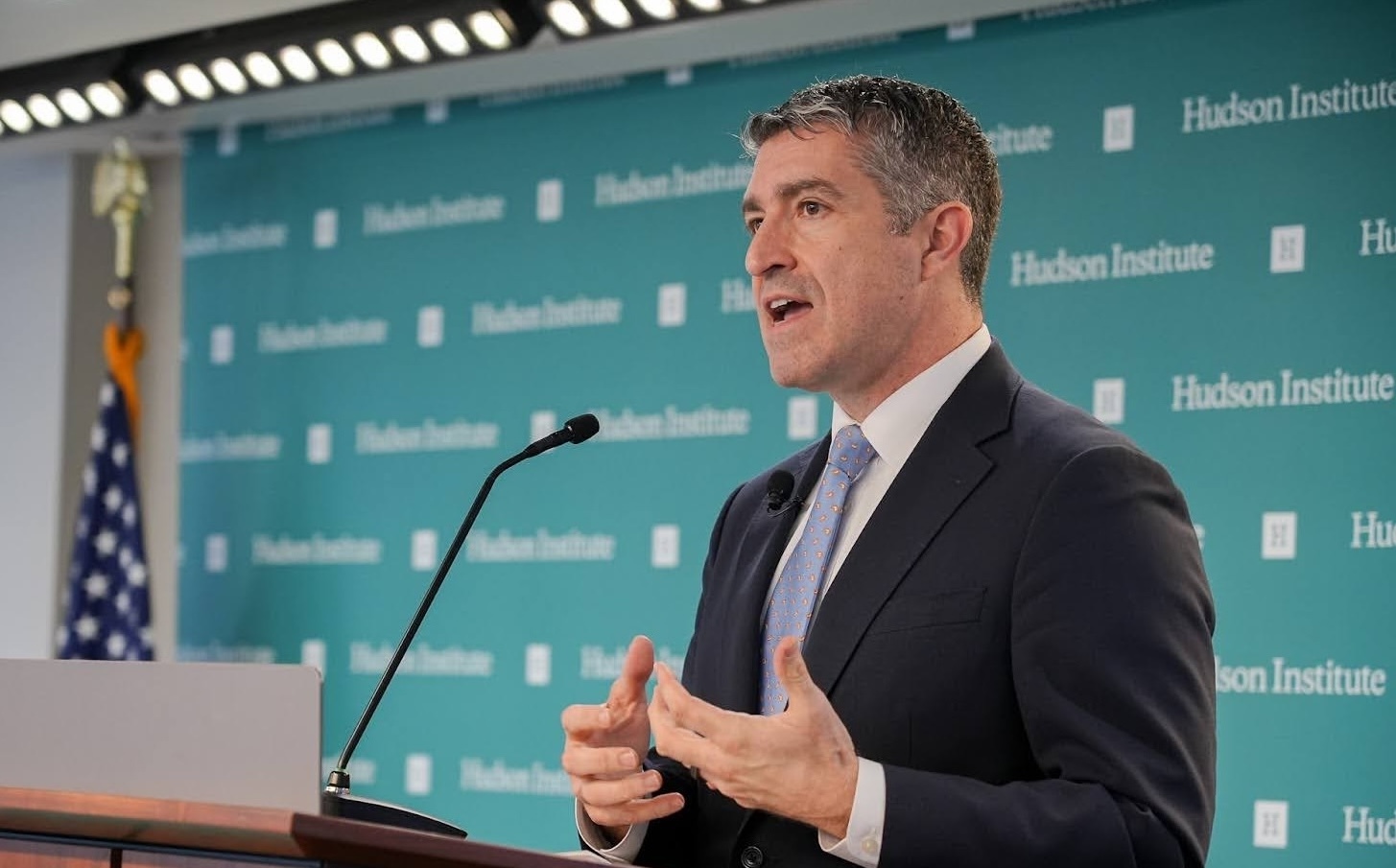An American cornerstone of the semiconductor supply chain has agreed to plead guilty and pay more than $140 million in total for unlawfully exporting design tools to a restricted Chinese military university, the Justice Department and the U.S. Attorney’s Office for the Northern District of California announced this week.
Cadence Design Systems Inc. was charged with conspiracy to commit export control violations, and it also faced a parallel civil enforcement action from the Commerce Department’s Bureau of Industry and Security (BIS). The violations concerned its sale of $45.3 million in electronic design automation (EDA) services and technologies—which automate the design process for semiconductor chips—to the National University of Defense Technology between 2015 and 2021.
Cadence’s penalties underscore the U.S. government’s focus on exports of advanced and dual-use technologies to China. They also reflect how steep the repercussions can get if businesses identify a major potential export risk and fail to act.
Catch up: The U.S. enforcement actions follow what had looked to be a reprieve for Cadence and fellow EDA power Synopsys, which announced earlier this month that the Trump administration was dropping newly proposed restrictions on EDA sales to China.
Writing about that rollback in the Brief, Kharon equity research analyst James Warner noted that Chinese semiconductor companies—including some with risky state and military ties—have remained largely reliant on the U.S. EDA firms’ tech. That “unique market position,” Warner wrote, “could still attract regulatory action for them and their partners in China.”
According to company filings, Cadence generated $4.64 billion in total revenue in fiscal year 2024, of which $573 million came from China.
The charges: NUDT, the Chinese university, was added to the U.S. Entity List in February 2015 because of its use of “U.S.-origin multicores, boards, and (co)processors to produce the TianHe-1A and TianHe-2 supercomputers.”
Cadence and its indirectly owned subsidiary in China proceeded, however, to supply restricted EDA tools to NUDT through Central South CAD Center (CSCC), an alias for NUDT, and through an associated company, Phytium Technology Co. Ltd., without the requisite licensing from BIS.
Cadence Design Systems Inc. was charged with conspiracy to commit export control violations, and it also faced a parallel civil enforcement action from the Commerce Department’s Bureau of Industry and Security (BIS). The violations concerned its sale of $45.3 million in electronic design automation (EDA) services and technologies—which automate the design process for semiconductor chips—to the National University of Defense Technology between 2015 and 2021.
Cadence’s penalties underscore the U.S. government’s focus on exports of advanced and dual-use technologies to China. They also reflect how steep the repercussions can get if businesses identify a major potential export risk and fail to act.
Catch up: The U.S. enforcement actions follow what had looked to be a reprieve for Cadence and fellow EDA power Synopsys, which announced earlier this month that the Trump administration was dropping newly proposed restrictions on EDA sales to China.
Writing about that rollback in the Brief, Kharon equity research analyst James Warner noted that Chinese semiconductor companies—including some with risky state and military ties—have remained largely reliant on the U.S. EDA firms’ tech. That “unique market position,” Warner wrote, “could still attract regulatory action for them and their partners in China.”
According to company filings, Cadence generated $4.64 billion in total revenue in fiscal year 2024, of which $573 million came from China.
The charges: NUDT, the Chinese university, was added to the U.S. Entity List in February 2015 because of its use of “U.S.-origin multicores, boards, and (co)processors to produce the TianHe-1A and TianHe-2 supercomputers.”
Cadence and its indirectly owned subsidiary in China proceeded, however, to supply restricted EDA tools to NUDT through Central South CAD Center (CSCC), an alias for NUDT, and through an associated company, Phytium Technology Co. Ltd., without the requisite licensing from BIS.
- Risk nexus: A website for NUDT reviewed by Kharon in 2020 said the university was “under the direct leadership of the Central Military Commission,” a unit of the Chinese government and Chinese Community Party.

Go deeper: According to court documents, “Cadence, Cadence China, and their employees exported, reexported, and transferred in-country U.S.-origin EDA tools to CSCC … despite having knowledge that CSCC was an alias for NUDT.”
One employee drafted a presentation for her colleagues that stated that U.S. export restrictions meant Cadence could not do business with NUDT. BIS said Cadence “had reason to know CSCC was closely linked to NUDT, including that equipment sold or loaned to CSCC was installed on the NUDT campus and that CSCC and NUDT shared personnel.” Yet business with CSCC continued.
Cadence continued to send restricted EDA tech to Phytium until it undertook an internal compliance review and discontinued such sales in March 2021. The next month, Phytium, too, was added to the Entity List.
Soundbite: Cadence “has agreed to accept responsibility … and has implemented a strong export compliance program to help prevent any further illegal transmission of American technology,” Assistant Attorney General for National Security John A. Eisenberg said in the announcement’s news release. “American ingenuity is one of our Nation’s most precious assets, and the National Security Division will vigorously enforce U.S. export control laws to protect the technological advantage we enjoy because of that ingenuity.”
Kharon Research contributed to this report.
More from the Kharon Brief:
One employee drafted a presentation for her colleagues that stated that U.S. export restrictions meant Cadence could not do business with NUDT. BIS said Cadence “had reason to know CSCC was closely linked to NUDT, including that equipment sold or loaned to CSCC was installed on the NUDT campus and that CSCC and NUDT shared personnel.” Yet business with CSCC continued.
- All told, court documents say, “Cadence and Cadence China exported and caused to be exported at least 56 unlawful exports of EDA tools from in or about February 2015 until in or about September 2020, when Cadence terminated Cadence China’s business relationship with CSCC due to CSCC’s association with NUDT.”
Cadence continued to send restricted EDA tech to Phytium until it undertook an internal compliance review and discontinued such sales in March 2021. The next month, Phytium, too, was added to the Entity List.
Soundbite: Cadence “has agreed to accept responsibility … and has implemented a strong export compliance program to help prevent any further illegal transmission of American technology,” Assistant Attorney General for National Security John A. Eisenberg said in the announcement’s news release. “American ingenuity is one of our Nation’s most precious assets, and the National Security Division will vigorously enforce U.S. export control laws to protect the technological advantage we enjoy because of that ingenuity.”
Kharon Research contributed to this report.
More from the Kharon Brief:







